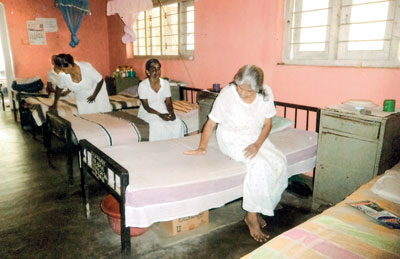News
Anti-poverty banks to host care centres for seniors
Care centres will be set up at 1,074 Samurdhi bank branches next year to provide recreational and basic health services for the elderly during the day time.
Samurdhi banks were set up to help reduce poverty in 1995 but lacked proper management and became politicised.
Dr Sunil Jayantha Nawaratne, director general of the Department Of Samurdhi Development, said the centres would have equipment to measure blood pressure and blood glucose levels. Books, newspapers, and magazines will be provided along with TV. In addition, the elderly will be able to play indoor recreational games like carrom, chess, and cards.

More elderly homes will be built on a public-private partnership basis
“With the assistance of volunteers, massage services and PT sessions will also be held. There are plans to invite a doctor, too, to do regular medical checkups,” Dr Nawaratne said.
Elders may also be provided with lunch and tea, depending on facilities available.
Dr Nawaratne said he hopes skilled elderly people can even start small-scale activities such as repairing electric appliances, or mobile phones.
“The assistance of various government officials in the areas, including Samurdhi development officers, social service officers, and the Divisional Secretariats will be sought,’’ he said. He added the relevant circulars will be issued soon.
Dr Nawaratne said the centres will be funded with ministry resources and donations from volunteer organizations and also UNICEF.
According to the Census and Statistics Department, there are 2.52 million elderly people — those above 60 years of age.
By 2041, their numbers are forecast to account for nearly 25% of the total population.
According to the department, the elderly population is rising as a result of a number of factors, including, the low fertility rate, direct foreign migration and longer life expectancy. The life expectancy has increased to 78.6 years for women and 72 years for men in 2012 from 77.2 years and 68.8 years in 2001. In 1946 the two values were 44.7 years and 46.8 years, while in 1981 they were 72.1 years and 67.7 years respectively.
According to the Census of Population and Housing in 2012, nearly 25.6% of the population over 60 years, was economically active out of which 1.2% was searching for jobs while others were employed.
Statistics also revealed that out of 556,960 people who were 75 or over 75 years old, 9.3% was economically active, out of that 3% were searching jobs and the rest were employed.
Further out of the 74.4% economically inactive elderly population, 16% received a pension, while 0.6% were engaged in social services activities.
Shirani Weerakoon, secretary of the Ministry of Social Empowerment, Welfare and Kandyan Heritage, said the elderly care centre concept is common elsewhere including South Korea and Singapore.
But, in Singapore, care centres are tailor-made, barrier-free, more advanced and run by well-trained people.
Ms Weerakoon said two elderly homes in Tangalle and Kataragama will be expanded while another two in Attidiya and Kandy, will be built on a public-private partnership basis.
S. B. Dissanayake Minister of Social Empowerment, Welfare and Kandyan Heritage, said the programme aims to protect elders from non communicable diseases at least until 75 years of age. He said some elderly people were addicted to drugs and alcohol.
| UNHEALTHY PICTURE OF SRI LANKA’S ELDERLY | |
| When health is considered, the status of seniors in Sri Lanka is not a pretty picture, in a country where an elderly person can not go in to a clinic, a bank, or a post office in a wheelchair. Thousands are chronically sick and disabled. They are prone to accidents. The majority of Sri Lanka’s elderly persons are chronically ill and need constant medical and nursing care. Many Sri Lankans know of elderly who suffer dementia and who can’t be cared at ad hoc state “elderly care’’ centres. A household survey has shown that many of Sri Lanka’s elderly suffer from chronic illness such as high blood pressure, diabetes, arthritis, and asthma. Every one in two elderly persons suffers from chronic illness. In Colombo alone, 61% of elderly men and 65% of women are chronically ill. In Gampaha, it is 65% for both, while it is 59% in Hambantota. In Polonnaruwa, 61% of men and women are chronically ill. In Jaffna, it is 56%. It is nearly 56% in Matale. Many elderly also suffer from acute illnesses such as diarrhoea, vomiting, fever, headache, joint pain, and skin diseases. Also, the Census of Housing and Population of 2012, revealed that a third of the seniors are disabled — vision, hearing, walking, remembering and concentration, self-care, or speaking. There are generally two groups of elderly — the young old, aged 60-79 years and those aged 80 years or more. |

